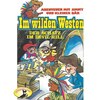Kitabı oku: «Plain English», sayfa 20
Exercise 3
Mark all of the prepositions in the following poem. Write the entire phrases and mark the word which is the object of the preposition. For example, in the phrase in the second line; from a rich dream, dream is the object of the preposition from; and a and rich modify the noun dream.
Abou Ben Adhem (may his tribe increase)
Awoke one night from a rich dream of peace,
And saw, within the moonlight of his room,
Making it rich, and like a lily in bloom,
An angel, writing in a book of gold.
Exceeding peace had made Ben Adhem bold,
And to the Presence in the room he said,
"What writest thou?" The Vision raised its head,
And, with a look made of all sweet accord,
Answered, "The names of those who love the Lord."
"And is mine one?" said Abou. "Nay, not so,"
Replied the Angel. Abou spoke, more low,
But cheerily still; and said, "I pray thee, then,
Write me as one that loves his fellow-men."
The angel wrote and vanished. The next night
It came again, with a great wakening light,
And showed the names whom love of God had blessed,
And lo! Ben Adhem's name led all the rest.
—Leigh Hunt.
SPELLING
LESSON 19
There are a few prepositions which might really be called derivative prepositions.
1. A few prepositions are formed from verbs. These are really participle prepositions, for they are the present participles of the verbs but have come to be used like prepositions. These are such as concerning, excepting, regarding, respecting, during, according, etc. Nearly all of these participle prepositions can be expressed by a preposition phrase, as for example, we can either say; I wrote regarding these facts, or I wrote you in regard to these facts. I mentioned them all excepting the last, or, I mentioned them all with the exception of the last. I have gone according to the directions, or, I have gone in accord with the directions.
2. Derivative prepositions are also formed by prefixing a to other parts of speech, as along, around, abroad, etc. Strictly speaking these might be called compound prepositions for the prefix a is really from the preposition on.
3. We have also compound prepositions formed:
By uniting two prepositions, as into, within, throughout, etc.
By uniting a preposition and some other part of speech, usually a noun or an adjective, as beside, below and beyond.
We also have a number of compound verbs which are made by prefixing a preposition to a verb. Some of these compound words have quite a different meaning from the meaning conveyed by the two words used separately; as for example, the compound verb withstand, derived from the preposition with and the verb stand, has almost the opposite meaning from stand with.
Our spelling lesson this week includes a number of these compound verbs formed by the use of the verb and a preposition. Look up the meaning in the dictionary. Use them in sentences in the compound form; then the two words separately as a verb and a preposition and note the difference in the meaning.
Monday
Upset
Withdraw
Outrun
Overlook
Understand
Tuesday
Oversee
Undergo
Outnumber
Withhold
Overcome
Wednesday
Overflow
Undertake
Overreach
Overthrow
Outshine
Thursday
Overhear
Withstand
Overgrow
Overhaul
Overrun
Friday
Concerning
Regarding
Respecting
According
Excepting
Saturday
Against
Throughout
Around
Between
Beneath
PLAIN ENGLISH
LESSON 20
Dear Comrade:
We are taking up in this lesson the study of the last important part of speech. We have spent some little time on the study of these parts of speech, but it has been time well spent. We cannot use good English and construct sentences that express our thoughts without an adequate knowledge of the words we use in sentence building. As soon as we finish the study of the parts of speech, we will spend several weeks in sentence building. This will give us a review of these lessons in which we have studied separate words.
The English language is one of the most interesting of all to study. It is the most truly international of all languages, for the English language contains words from almost every language in the world. Did you ever stop to think that we could have internationalism in language as well as in other things? We can be as narrowly patriotic concerning words as concerning anything else.
Nations have been prone to consider all those who do not speak their language as barbarians. Germany, perhaps, possesses as strong a nationalistic spirit as any country, and in Germany this spirit has found expression in a society formed for the purpose of keeping all foreign words out of the German language. They have published handbooks of native words for almost every department of modern life. They insist that the people use these words, instead of foreign importations. The German State takes great pride in the German language and considers it the most perfect of any spoken today. The rulers of Germany believe that it is a part of their duty to the world to see that all other nations speak the German language. In conquered Poland, only German is permitted to be taught in the schools or to be spoken as the language of commerce. The patriots in language seem to believe that there is some connection between purity of language and purity of race.
In English, however, we have the beginnings of an international speech. Our civilization is derived from various sources. Here in America we are truly the melting-pot of the nations, and this is mirrored forth in our language which is, in a way, a melting-pot also, in which have been thrown words from every tongue. Those for whom nationalism is an important thing will probably cling to the idea of a pure unmixed language, but to those of us to whom Internationalism is not an empty word, but a living ideal, an international language becomes also part of the ideal.
There is a wealth of wonderful literature open to us once we have gained a command of the English language. Pay especial attention to the quotations given in each lesson. These are quotations from the very best literature. If there are any of them that arouse your interest and you would like to read more from the same author, write us and we shall be glad to furnish you full information concerning further reading.
Yours for Education,THE PEOPLE'S COLLEGE.
CONJUNCTIONS
328. You remember that in Lesson 3, where we studied the parts of speech, we found that we had another connective word besides the preposition,—the conjunction.
A preposition connects two words and shows what one of them has to do with the other. The conjunction plays a different part as a connective, for it connects not only words but also phrases and clauses. Note the following sentences:
Shall we be men or machines?
We must struggle for ourselves and for our children.
We pray for peace but furnish ammunition for war.
The use of the conjunction saves a great deal of tiresome repetition, for, by its use, where two subjects have the same predicate or two predicates have the same subject, we can combine it all into one sentence.
You will readily realize how important this part of speech is to us. If we did not have conjunctions our speech would be cumbersome and we would have to use a great many short sentences and a great deal of repetition. If we wanted to make the same statement concerning a number of things, without conjunctions, we would have each time to repeat the entire statement. Try to write a description of a scene and avoid the use of conjunctions and you will see what an important part these connective words play in our power of expression.
Without the use of the conjunction, you would necessarily use a great many short expressions and repeat the same words again and again, and your description would be a jerky, tiresome, unsatisfactory piece of writing.
Exercise 1
Rewrite the following sentences, writing in separate sentences the clauses that are united by the conjunctions:
1. The birds are singing and spring is here.
2. We talk of peace, but war still rages.
3. The unemployed cannot find work and they are dying of hunger.
4. We believed in war for defense and every nation is now fighting for defense.
5. We believe in education and we are struggling for universal education.
6. The old order is fast passing and the new order is rapidly appearing.
7. Profit is the keynote of the present, but service shall be the keynote of the future.
8. All children should be in school, but thousands must earn their bread.
Note that these sentences are made up of two or more simple sentences combined; and each of these simple sentences is called a clause, and each clause must contain a subject and a predicate.
Exercise 2
Rewrite the following simple sentences, using conjunctions to avoid a repetition of the same subject and predicate. Rewrite these into a paragraph, making as well written a paragraph as you possibly can:
One hundred years ago the workers fought for universal education.
As a result we have our public schools of today.
Our public schools have been our chief bulwark against oppression.
Our public schools are our chief bulwark against oppression.
Our public schools are our greatest safeguard for the protection of such liberty as we enjoy.
Our public school system embodies a socialistic ideal.
Our public school system is the most democratic of our institutions.
There has been a subtle subversion of the ideal.
The public school system has been made to serve the master class.
We have spent millions to make the ideal a reality.
Have we realized the ideal?
Is there universal education?
Is there education for every child beneath the flag?
The grounds of our public schools have cost millions.
The buildings have cost millions.
The courses of study are many.
They are varied.
They are elaborate.
But the workers of the world do not enjoy this feast.
The children of the workers do not enjoy this feast.
CLASSES OF CONJUNCTIONS
329. Conjunctions are divided into classes, as are other parts of speech, according to the work which they do. Notice the following sentences and notice how the use of a different conjunction changes the meaning of the sentence.
We are united and we shall win.
When we are united, we shall win.
In the first sentence the conjunction and connects the two clauses, we are united and we shall win. They are both independent clauses, neither is dependent upon the other, and both are of equal importance. But by the use of the conjunction when, instead of the conjunction and, we have changed the meaning of the sentence. There is quite a difference in saying, We are united and we shall win, and When we are united we shall win.
By connecting these two statements with the conjunction when, we have made of the clause, we are united, a dependent clause, it modifies the verb phrase shall win. It tells when we shall win, just as much as if we had used an adverb to modify the verb phrase, and had said, We shall win tomorrow, instead of, We shall win when we are united.
So in these two sentences we have two different kinds of conjunctions, the conjunction and, which connects clauses of equal rank or order, and the conjunction when, which connects a dependent clause to the principal clause.
330. So the conjunctions like and are called co-ordinate conjunctions. Co-ordinate means literally of equal rank or order. Conjunctions like when are called sub-ordinate conjunctions. Sub-ordinate means of inferior rank or order.
So we have our definitions:
331. A conjunction is a word that connects words or phrases or clauses.
A co-ordinate conjunction is one that joins words, phrases or clauses having the same rank.
A subordinate conjunction is one that connects a dependent clause to the principal clause.
CO-ORDINATE CONJUNCTIONS
332. Co-ordinate conjunctions connect words, phrases or clauses of equal rank. The most commonly used co-ordinate conjunctions are; and, but, or, nor.
333. But there are a number of words which we often use as adverbs, which may also be used as co-ordinate conjunctions. These words are not always conjunctions, for they are sometimes used as adverbs. When they are used as conjunctions they retain something of their adverbial meaning; but still they are conjunctions, for they are used to show the connection between two clauses of equal rank. Thus:
I am not in favor of the motion, nevertheless I shall vote for it.
The deputies voted for the war appropriation, notwithstanding they had carried on an extensive anti-war propaganda.
I did not believe in the change, however I did not oppose it.
334. The co-ordinate conjunctions which we use with this adverbial meaning also, are; therefore, hence, still, besides, consequently, yet, likewise, moreover, else, than, also, accordingly, nevertheless, notwithstanding, otherwise, however, so and furthermore.
These conjunctions always refer to what has been said before and serve to introduce and connect new statements.
335. We often use these conjunctions, and also, and, but, or, and nor, at the beginning of a separate sentence or paragraph to connect it in meaning with that which has gone before. You will often see the use of these conjunctions as the first word of a new paragraph, thus relating this paragraph to that which has preceded it.
336. Co-ordinate conjunctions connect words of equal rank.
NOUNS
Co-ordinate conjunctions may connect two or more nouns used as the subject of a verb. As:
Death and disaster follow in the wake of war.
In this sentence, death is just as much the subject of the verb follow as is the word disaster, but no more so. You can omit either of these words and the other will make a subject for the sentence. They are both of equal importance, both of the same rank in the sentence, and neither depends upon the other. These two words taken together form the subject of the sentence. This is called the compound subject, for it consists of two simple subjects.
Co-ordinate conjunctions may connect two or more nouns used as the object of a verb.
He studies history and science.
In this sentence the words history and science are both used as objects of the verb studies.
Co-ordinate conjunctions may connect two or more nouns used as the object of a preposition.
He called for the letters and the papers.
In this sentence letters and papers are both objects of the preposition for, connected by the co-ordinate conjunction and.
Exercise 3
Note in the following sentences the nouns which are connected by conjunctions and decide whether they are used as the subject of the sentences or the object of verbs or of prepositions. Draw a line under compound subjects.
1. John and Henry are going home.
2. Music and painting are fine arts.
3. The grounds and buildings of our public schools have cost millions.
4. The time calls for brave men and women.
5. We struggle for truth and freedom.
6. Will you study English or arithmetic?
7. Education and organization are necessary for success.
8. We must learn the truth about production and distribution.
9. We demand justice and liberty.
10. The great struggle is between the working class and the ruling class.
PRONOUNS
337. Co-ordinate conjunctions may also connect pronouns.
These are used in the same way as nouns,—either as subject or object. Nouns have the same form whether used as subject or object. Pronouns, however, have different forms when used as the object. Here is where we often make mistakes in the use of pronouns. When the pronouns are connected by co-ordinate conjunctions they are of the same rank and are used in the same construction;—if they are used as subjects both must be used in the subject form;—if they are used as objects, both must be used in the object form. For example, it is incorrect to say, He told the story to her and I. Here her is properly used in the object form, for it is the object of the preposition to; the pronoun I connected with her by the use of the conjunction and is also the object of the preposition to, and the object form should be used. You would not say, He told the story to I. The sentence should read, He told the story to her and me.
Co-ordinate conjunctions may connect two pronouns used as the subject of a sentence, as for example:
She and I arrived today.
Co-ordinate conjunctions may connect two pronouns used as the object of the verb, as for example:
Did you call her or me?
Co-ordinate conjunctions may connect two pronouns used as the object of the preposition, as:
He gave that to you and me.
Exercise 4
Study closely the following sentences and correct those in which the wrong form of the pronoun is used.
1. He and I are old friends.
2. Did you ask him or me?
3. They promised him and I that they would come.
4. Find the place for she and me.
5. Me and him will get it for you and she.
6. She and I will go with you.
7. You and I must decide matters for ourselves.
8. You will find him and her to be loyal comrades.
VERBS
338. Co-ordinate conjunctions are also used to connect verbs. Verbs connected in this way have the same subject; and with the use of the conjunction to connect the verbs, we save repeating the subject.
He reads and studies constantly.
In this sentence reads and studies are words of the same kind and of the same rank; either could be omitted and the other would make a predicate for the sentence. They are of equal importance in the sentence and are connected by the conjunction and. They have a single subject, the pronoun he.
This is called a compound predicate.
In the sentence, He reads constantly, we have a simple predicate, the single verb reads; but in the sentence, He reads and studies constantly, we have a compound predicate, compound of the two verbs reads and studies. A sentence may have both a compound subject and a compound predicate. As, for example:
John and James read and study constantly.
In this sentence John and James is the compound subject of both the verbs, read and study. So we have a compound subject and a compound predicate.
Exercise 5
Notice the verbs in the following sentences connected by co-ordinate conjunctions. Draw lines under each compound predicate.
1. The days come and go in a ceaseless round.
2. The brave man dreams and dares to live the dream.
3. The coward dreams but dares not live the dream.
4. We produce splendidly but distribute miserably.
5. The bought press twists and distorts the facts.
6. Only a traitor aids or supports the enemy.
7. We agitate and educate for the cause of liberty.
ADJECTIVES
339. Co-ordinate conjunctions are used to connect adjectives.
In this way we use a number of adjectives to modify the same word without tiresome repetition. When several adjectives are used to modify the same word, the conjunction is used only between the last two adjectives. As, for example:
A simple, clear and concise course has been prepared.
Exercise 6
In the following sentences, underscore the adjectives which are connected by co-ordinate conjunctions.
1. The plains of France are covered with the dead and dying soldiers.
2. Education should be both universal and free.
3. They are faithful and loyal comrades.
4. This was only our just and legal right.
5. Old and hoary was the man who sat on the stool by the fireless and godless altar.
6. The service of humanity is a sweet and noble task.
7. We must be brave and true.
8. He lived a noble and courageous life.
9. All was old and cold and mournful.
10. Most powerful and eloquent is the voice of the disinherited.
ADVERBS
340. Co-ordinate conjunctions are also used to connect adverbs. This gives us the power to describe the action expressed in verbs without the tiresome repetition of the verb. For example:
He spoke fluently and eloquently.
Exercise 7
In the following sentences underscore the adverbs which are connected by co-ordinate conjunctions:
1. Man selfishly and greedily prevents his fellow men from the enjoyment of nature's bounties.
2. She is wonderfully and gloriously brave.
3. He speaks eloquently and impressively, but very slowly.
4. Nature has provided lavishly and bountifully for her children.
5. Advice spoken truly and wisely is always in season.
6. We must resist injustice bravely and courageously.
7. He feels keenly and deeply the wrongs of his class.
8. He writes easily and rapidly.
9. The words, calmly and coolly spoken, were instantly opposed.
10. He reached that conclusion naturally and inevitably.
11. He was gently but unwaveringly firm.
12. The revolution comes slowly but surely.










